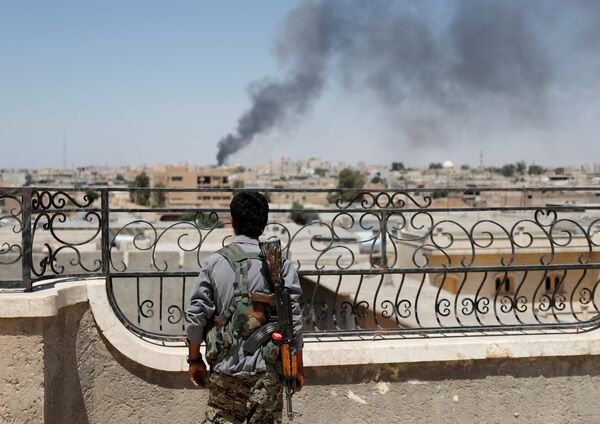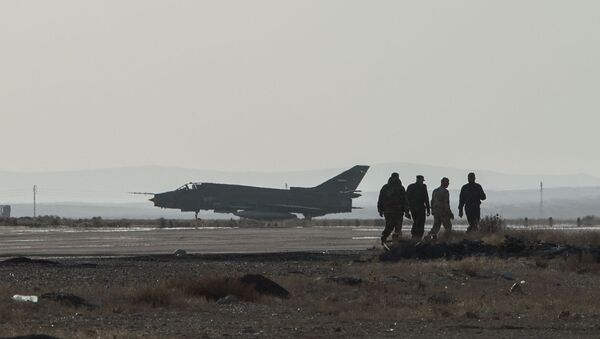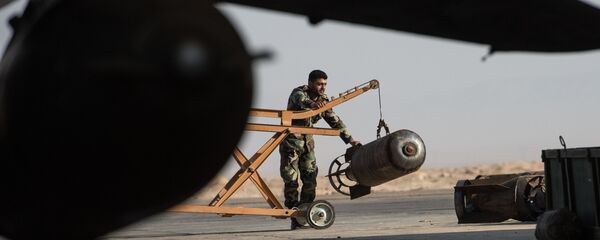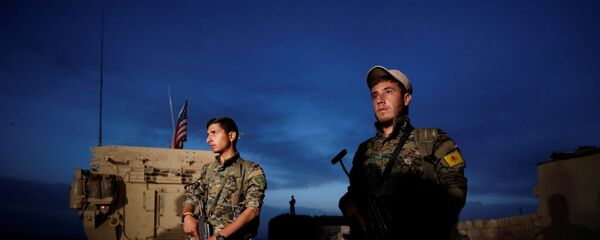Damascus, for its part, said that the Syrian aircraft was targeting the internationally-condemned terrorist group Daesh (ISIL/ISIS).
On Tuesday, the US-led coalition downed a Syrian drone near al-Tanf, explaining that it showed "hostile intent" while advancing toward coalition positions.
The incident, it claimed, took place in the same location where another pro-Syrian government drone had dropped munitions on June 8, targeting the SDF.

Having shot down the Syrian warplane, the US warned Turkey that any actions against the Kurdish People's Protection Units (YPG) "will not remain unanswered," Turkish journalist Mehmet Ali Guller told Sputnik Turkey.
"By downing a Syrian military jet which targeted SDF positions, mainly composed of YPG units, Washington once again showed its perseverance in the use of Kurdish units as a land force in Syria," he said.
He recalled in this regard that the main purpose of Turkey's "Shield of the Euphrates" military operation was to prevent the deployment of Kurdish self-defense units to the west and south of the Euphrates.
"It is for this reason that Turkey needs to join the Russia-Syria-Iran bloc, which opposes the US-led operation involving the YPG. If Turkey does so, it will succeed both in preserving the territorial integrity of Syria and destroying threats to its own national security. But despite Turkey's persistent efforts to normalize its ties with Russia and Iran, there was no progress on the matter because of Ankara's lack of cooperation with Damascus," Guller said.
He underscored that Turkey should consider the incident with the downed Syrian warplane as a chance for rapprochement with Damascus and take appropriate steps to this end.
Question is not if US will defend Kurds in N Syria against Assad, it is what will US do when Turkey enters N Syria to stop PKK/YPG ambitions
— Ronald Spitzer (@Ronald_Spitzer) 22 июня 2017 г.
Oytun Orhan, of the Ankara-based Center for Middle Eastern Strategic Studies (ORSAM), for his part, told Sputnik Turkey that it is important for Ankara to maintain cooperation with Russia in Syria, which will help it oppose US policy that threatens Turkey's territorial integrity.
"There were no drastic changes in Turkey's Syrian policy, but Ankara changed its priorities," Orhan said, referring to Turkey's push for destroying the threat emanating from what Ankara sees as the terrorist organizations acting in Syria's northern areas.
Kurdish issue is arguably the only issue that unite Syrian gov, opposition, Turkey, Iran, and Iraq. US can't defend Kurdistan Syria forever
— Bassem (@BBassem7) 20 июня 2017 г.
"Syrian President Bashar Assad's government should not be concerned about such priorities because Ankara, Damascus and Tehran are united in their opposition to the US strategy of creating an area of influence in northern Syria," Orhan added.
"This indicates that in the event of a possible clash in Syria's east, Turkey will most likely make its choice in favor of close interaction with Russia rather than the United States. There's little doubt, given that Washington continues to cooperate with the YPG, which is recognized by Turkey as a terrorist organization," Orkhan concluded.





